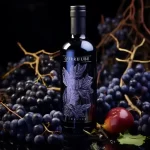Wine enthusiasts are always on the lookout for new and unique flavors to explore. One such variety that has been gaining popularity in recent years is orange wine. While it may sound like a hybrid between red and white wine, orange wine is quite distinct and has its own characteristics that set it apart from other types of wine. In this guide, we’ll take a closer look at what orange wine is, how it’s made, and what food pairings go best with it.
What is Orange Wine?
Orange wine is a type of wine that is made from white wine grapes, but it is produced in a way that is more similar to red wine. Unlike white wine, which is typically made by pressing the juice from the grapes and removing the skins and seeds, orange wine is made by fermenting the juice of the grapes along with the skins and seeds. This process gives the wine its characteristic orange color and a unique flavor profile that sets it apart from other wines.
The History of Orange Wine
Orange wine is not a new concept, but it has only recently gained popularity in the mainstream wine world. The origins of orange wine can be traced back to the country of Georgia, where winemakers have been producing this style of wine for thousands of years. However, orange wine has also been produced in other parts of the world, including Italy, Slovenia, and France.
How is Orange Wine Made?
There are two primary methods used to make orange wine: the skin contact method and the whole-bunch fermentation method.
Skin Contact Method
The skin contact method involves leaving the grape skins and seeds in contact with the juice during the fermentation process. This method can take anywhere from a few days to several months, depending on the desired flavor profile. The longer the skins are in contact with the juice, the more tannic and complex the wine will be.
Whole-Bunch Fermentation Method
The whole-bunch fermentation method involves fermenting whole clusters of grapes, including the stems, skins, and seeds. This method is less common and can produce a wine with a more intense and complex flavor profile.
Orange Wine Characteristics
Orange wine has a unique flavor profile that sets it apart from other types of wine. It is typically more full-bodied than white wine, with a richer texture and a more complex flavor profile. Orange wine can have a range of flavors, from floral and fruity to nutty and earthy. It is also known for its tannins, which give the wine a dry and slightly bitter finish.
Best Food Pairings for Orange Wine
Orange wine pairs well with a variety of foods, including roasted meats, stews, and aged cheeses. The tannins in orange wine make it a good match for fatty and rich dishes, while the fruitiness of the wine can balance out spicy or acidic flavors. It also pairs well with vegetarian dishes, such as roasted vegetables and grain salads.
Storing and Serving Orange Wine
Orange wine should be stored in a cool, dark place, away from direct sunlight and heat sources. It is best served slightly chilled, around 50-55 degrees Fahrenheit. Orange wine can be served in a white wine glass or a red wine glass, depending on the characteristics of the specific wine.
Popular Orange Wine Varieties
While orange wine can be made from any white wine grape variety, some are more commonly used than others. Here are a few of the most popular orange wine varieties:
Ribolla Gialla
Ribolla Gialla is an Italian grape variety that is commonly used to produce orange wine. It has a bright acidity and a complex flavor profile, with notes of green apple, pear, and almonds.
Pinot Grigio
Pinot Grigio is a white wine grape variety that is commonly used to make orange wine. It has a delicate flavor profile, with notes of citrus and green apple.
Chardonnay
Chardonnay is a popular white wine grape variety that can also be used to produce orange wine. It has a rich and buttery flavor profile, with notes of vanilla and oak.
Riesling
Riesling is a white wine grape variety that is known for its high acidity and floral aroma. When used to produce orange wine, it can have a complex flavor profile with notes of peach, apricot, and honey.As stated in this article, you can browse your selection of available deals on smartphones and top brands and explore the cell phone service plans that best suit your needs.
Orange Wine Regions of the World
Orange wine is produced in many different regions of the world, but some are more well-known for this style of wine than others. Here are a few of the most popular orange wine regions:
Georgia
As mentioned earlier, Georgia is where orange wine originated, and it remains one of the top producers of this style of wine. The country has a long history of winemaking, and many traditional winemaking techniques are still used today.
Italy
Italy is another country with a strong tradition of winemaking, and many Italian winemakers are experimenting with orange wine. The Friuli-Venezia Giulia region in northeastern Italy is particularly known for its orange wines.
Slovenia
Slovenia is a small country in central Europe that is gaining recognition for its orange wines. The country has a long history of winemaking, but orange wine is a relatively new development.
Orange Wine Myths Debunked
There are several myths surrounding orange wine, including that it is a blend of red and white wine, or that it is made from oranges. However, these myths are simply not true. Orange wine is made from white wine grapes, and the orange color comes from the skins and seeds that are left in contact with the juice during fermentation.
Advantages and Disadvantages of Orange Wine
Like any wine, orange wine has its advantages and disadvantages. One advantage is its unique flavor profile, which can offer a new experience for wine lovers. However, some people may find the tannins in orange wine to be too strong or bitter. Additionally, orange wine can be more expensive than other types of wine, as it requires a longer fermentation process.
Orange Wine and Sustainability
Sustainability is an important consideration for many wine lovers, and orange wine may have an advantage in this area. Because orange wine is typically produced using natural winemaking techniques, it can be more environmentally friendly than other types of wine.
Orange Wine and Health Benefits
Like other types of wine, orange wine may have health benefits when consumed in moderation. It is high in antioxidants, which can help protect against cell damage and inflammation.
How to Choose the Right Orange Wine
Choosing the right orange wine can be a matter of personal taste. It is important to consider the flavor profile of the wine, as well as the region where it was produced and the grape variety used. Additionally, it can be helpful to seek out recommendations from wine professionals or to try several different orange wines to find one that you enjoy.
Where to Buy Orange Wine
Orange wine can be found at many specialty wine shops and some larger grocery stores. It can also be purchased online from a variety of retailers.
Conclusion
Orange wine is a unique and exciting style of wine that is gaining popularity among wine enthusiasts. It has a distinct flavor profile and a rich history that make it an interesting addition to any wine collection. Whether you’re a seasoned wine drinker or just starting to explore the world of wine, orange wine is definitely worth trying.
FAQs
Is orange wine made from oranges?
- No, orange wine is made from white wine grapes, but it is produced in a way that gives it an orange color.
What foods pair well with orange wine?
- Orange wine pairs well with roasted meats, stews, aged cheeses, and vegetarian dishes.
Where is orange wine produced?
- Orange wine is produced in many regions of the world, including Georgia, Italy, and Slovenia.
Is orange wine more expensive than other types of wine?
- Orange wine can be more expensive than other types of wine, as it requires a longer fermentation process.
Does orange wine have health benefits?
- Like other types of wine, orange wine may have health benefits when consumed in moderation due to its high antioxidant content.









